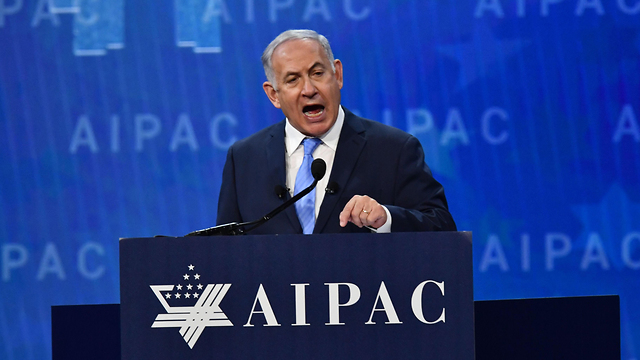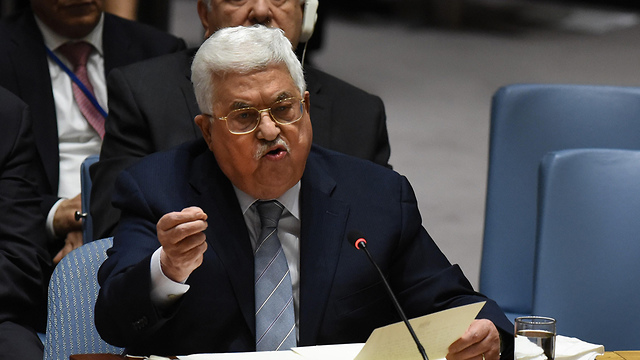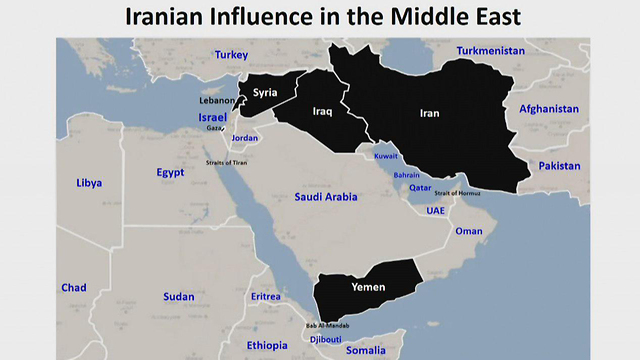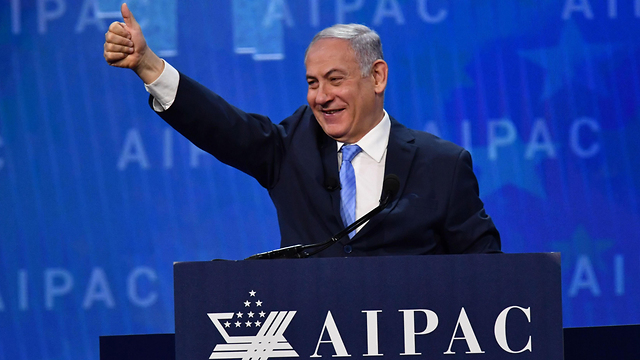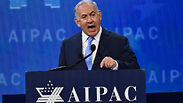

Netanyahu vows 'we will stop' dark Iranian empire
Israeli premier tells AIPAC Conference 'we must stop Iran and we will stop Iran,' while urging PA President Mahmoud Abbas to 'embrace peace' and praising the 'beautiful alliance' between the US and Israel; pledges Israel will be right by US's side if Trump withdraws from Iranian nuclear deal.
Prime Minister Benjamin Netanyahu told the American Israel Public Affairs Committee (AIPAC)'s annual Conference Tuesday that “we must stop Iran and we will stop Iran,” while urging Palestinian Authority President Mahmoud Abbas to “embrace peace” and praising the “beautiful alliance” between the US and Israel.
After delivering a presentation about Israel’s technological value on the world stage and outlining his optimistic vision for his country's ability to further “change the world,” the Israeli premier turned his attention to “the bad news.”
"The bad news is that bad things are getting worse. We have to deal with this challenge and I’m thinking specifically what do we do about Iran—he force behind so much of what is bad is this radical tyranny in Tehran," he told his audience.
The prime minister further reiterated that Iran remains bent on building permanent military bases in Syria via a corridor through which it can move its army and its navy to the war-torn country and threaten Israel's northern frontier.
The Islamic Republic, he said, is responsible for “darkness descending” on the Middle East by building an anti-Israel empire.
"It’s also seeking to develop, to build precision guided missile factories in Syria and Lebanon against Israel. I will not let that happen. We will not let that happen. We must stop Iran. We will stop Iran," he repeated as the crowd extended one of many rounds of applause. “We will not allow Iran to develop nuclear weapons. No now, not in ten years, not ever.”
Netanyahu then said that he "saluted" President Trump on his tough stance toward the Iranian regime and pledged Israel’s unwavering support in the event that the US announces its withdrawal from the agreement signed by the Obama administration.
“Israel will be right there by America’s side, and let me tell you, so will other countries in the region,” he told the jubilant sea of Israel supporters.
The prime minister emphasized that Israel’s quarrel is not with the Iranian people, but only with its tyrannical regime.
“We stand with those in Iran who stand for freedom. I believe that a day will come when this horrible tyranny will disappear,” he predicted, adding that this would usher in a reestablished era of historical friendship between the Jews and the Persian people.
Even the bad, however, was “paradoxically” creating new opportunities to forge relationships between Israel and other Arab countries, Netanyahu noted, who no longer view Israel as their enemy but as their indispensible partner in confronting the nuclear-thirsty regime in Iran.
Addressing the peace initiative currently being formulated by the Trump administration, and praising the American team in their efforts to bring about a permanent solution to the intractable Israel-Palestinian conflict, Netanyahu called on Palestinian Authority President Mahmoud Abbas to cease to abet terror by paying murderers of Jews.
“Israel remains committed to achieving peace with all our neighbors including the Palestinians … I have made it clear that I am committed to peace. But to get peace, President Abbas has to embrace peace and to stop supporting terror,” he said.
"Raise your hands high if you agree with me that President Abbas should stop paying terrorists who murder Jews,” he instructed the audience.
“I have a message for President Abbas: Stop paying terrorists!” because the message sent is kill Jews and get rich," he continued. “Build life, don’t pay death. Invest in life."
The speech began however, on an optimistic note, with Netanyahu expressing his gratitude to President Trump for his decision to recognize Jerusalem as Israel's capital last year.
“As I told President Trump yesterday, it’s especially great to be in America’s capital now that he has recognized Jerusalem as Israel’s capital. Thank you Mr. Trump for that historic decision,” he enthusiastically yelled into the microphone as he began his remarks.
“Thank you for announcing another decision, to move the American Embassy from Tel Aviv to Jerusalem this independence Day.”
Netanyahu also thanked US Ambassador to the US David Friedman and Israel’s Ambassador to the US, Ron Dermer, before singling out his “tremendous friend” for his stalwart support for Israel, the former prime minister of Canada, Stephen Harper.
In his characteristic penchant for departing with conventions when addressing audiences at prominent forums, Netanyahu said he wanted to see all the crowd but was unable to from where he was standing. “I don’t want to stand this podium. Is it ok? What the heck, I’m the prime minister,” he said before walking across the stage and continuing his remarks.
Israel, he continued, had demonstrated that it serves as a bulwark against international terrorism, citing as a recent example its Military Intelligence Directorate's (MID) Unit 8200 which helped Australia thwart an attempt to bomb a commercial plane last year.
Israel’s role in countering terror, he said, was not the only good news. It’s robust economy, the lobbyists were told, was attracting some of the largest companies in the technological sphere.
Listing giants such as Apple and Facebook, Netanyahu boasted that they all had research centers in Israel.
“Israel is literally driving the world,” he added, highlighting the country’s booming industry in autonomous vehicles. “We’re punching 200 times above our weight. That’s one heck of a punch.”
With Israeli technology incorporated into practically every commonly used electrical gadget and appliance, Netanyahu said that anti-Israel organizations such as the Boycott, Divestment, Sanctions (BDS) movement was positioning itself on the wrong side and would eventually pay the price.
"Remember when people spoke about Israel’s isolation? Pretty soon, the countries that don’t have relations with Israel will be isolated. The countries who talk about boycotting Israel—we’ll boycott them.”
Netanyahu met with Trump at the White House Monday, and was told by the president that he may come to Israel for the opening of the new American Embassy.
Trump asserted that decision to move the US embassy from Tel Aviv to Jerusalem "was a wonderful thing, and I know it was very much appreciated in a big part of the world, not just in Israel."
"That was a decision I had to make. Many presidents were discussing whether or not to make that decision, and they promised this in their campaigns, but they never were able to do what they should have done," he asserted.
Netanyahu thanked Trump for Washington's decision to recognize Jerusalem as the Israeli capital and move its embassy to the holy city. "This is the first time we meet in Washington, America's capital, after you declared Jerusalem as Israel's capital. And this was a historic proclamation, followed by your bold decision to move the embassy by our upcoming national independence day," Netanyahu told Trump.
"I want to tell you that the Jewish people have a long memory," the prime minister continued, detailing other important decisions in the history of the Jewish people. "This will be remember by our people throughout the ages," he determined. "Others talked about it, you did it."
The Middle East peace process grew even more complicated recently after Jared Kushner, the president's son-in-law and one of his senior advisers, lost his top-secret security clearance.
But Netanyahu sounded optimistic about the peace process, noting that "the Arabs have never been closer to Israel; Israel has never been closer to the Arab states. And we seek also to broaden that peace to the Palestinians."
Trump himself was also confident of the chances to reach peace between Israel and the Palestinians, asserting that "If we could do peace between Israel and the Palestinians, that would be a great thing for the world, that would be a great thing for this country, and a great thing for everybody."
The American president further insisted that by recognizing Jerusalem as Israel's capital, "We've taken (the dispute over Jerusalem) off the table. So this gives us a real opportunity to peace."
He was also hopeful that "the Palestinians, I think, want to come back to the table. If they don't, you don't have peace. That's a possibility also. I'm not saying it's going to happen."
AFP contributed to this report.














